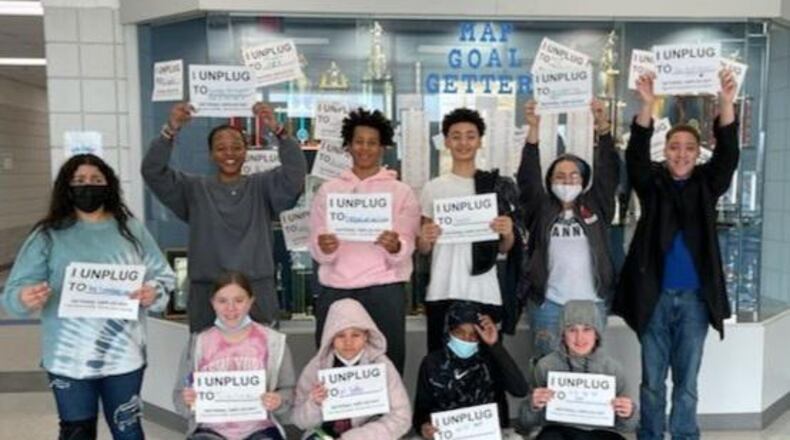A youth summit last fall brought several county schools together to discuss what could improve students’ lives. The findings revealed several students had feelings of depression or anxiety. Improving communication with their parents and searching for the root causes and how to resolve them were goals.
They took a survey and found that 31% of the kids eat dinner in their bedroom and 11% on the couch, while 60% are allowed to be on their phones and 41% have the television on during dinner.
Each school is doing different projects and a committee of about 10 at Roosevelt considered several options including a community dinner before making Day of Unplugging their target. They even named their group the Unplug Project.
“The biggest takeaway is it’s coming from the kids,” said Amber Holdeman, Roosevelt school counselor. “Ours landed on quality time. They viewed it as their parents are attracted to their devices as much if not more than the kids.”
Eighth-grader Joshua Woods said kids and their families need to talk and having family meal time helps catch up on what’s going on in their lives. He also recognizes everybody has tough days and that time won’t be a given, but they should put in the effort and this day could be the starter.
The program is voluntary, but it’s being made schoolwide with announcements and encouragement. Several students will wear the T-shirts they designed for the Unplug Project to school today to enhance participation and build excitement.
There are incentives for participating. Students who have parents sign a contract that they did the challenge will be entered into a drawing for a gift basket and gift cards.
Woods said some students aren’t thrilled being without their electronics and others are happy to take a break for the chance at real communication. He has a cell phone, but it’s not attached to him as Woods spends a lot of time at the gym or practicing for track season.
“I’m not on my phone even two hours a day, but some kids have theirs on them 24-7 with messages and social media,” he said.
Woods said the goal is for students to realize it’s OK to unplug and it can relieve some worries. He also cautions the future may not get any easier when it comes to electronic addiction.
“Worry about what’s going on with your parents and cherish that time with them,” said Woods. “New technology will come along and for kids addicted to their electronics now, there will be something even more addictive in the future. I’m saying that now and I’m 13.”
Holdeman hopes this will become more than a one-day cause and a step in improving their feelings of anxiety and depression.
“It’s nice to see kids interested in being open to better communications with their parents and guardians,” she said.
About the Author
